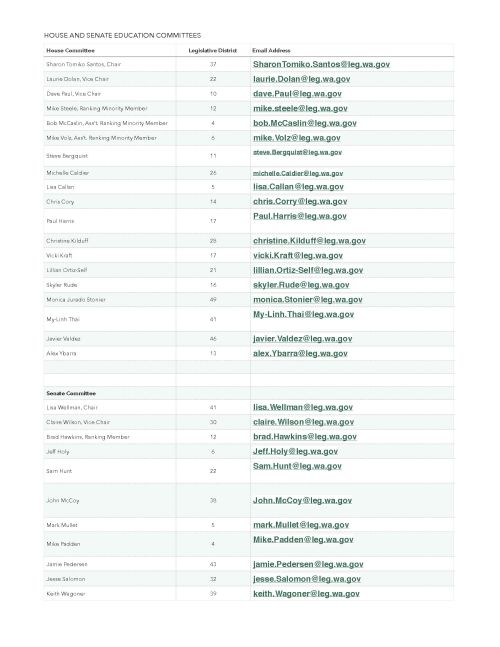What follows is the letter we sent to the House Appropriations Committee requesting that they schedule a hearing for SSB 5354 as soon as possible. If you’ve not yet shared your support for SSB 5354, please follow this link and choose the option to comment on this bill.
Members of the House Appropriations Committee:
SSB 5354: Concerning Programs for Highly Capable Students makes several targeted adjustments to existing law to correct problems that make Washington’s current highly capable program inequitable. As amended in the House Education Committee, perhaps the most important of those adjustments has been removed. Removal of universal screening will perpetuate existing inequities in the highly capable identification process and stands in direct opposition to the recommendations of scores of experts in the field. I urge you to schedule a hearing on SSB 5354 as soon as possible, and further that you restore the language requiring universal screening.
In recent years, Washington State has taken tremendous strides towards making access to highly capable services more equitable. Highly capable services are now recognized as basic education and are funded in the prototypical school model. Last year, the legislature explicitly required districts to prioritize the identification of low-income students but gave no direction on how best to achieve that goal.
The changes made by SSB 5354 reflect a comprehensive set of reforms that provide evidence-based guidance in support of increasing equity in our state’s highly capable programs. As passed unanimously by the Senate, SSB 5354 would also have required districts to adopt universal screening to ensure no student slips through cracks in the system.
The existing referral system misses too many students. This is not just a Washington state problem. It is a national concern. The research on this is clear.
The use of the nomination stage as the first step in the identification process is pervasive across the field of gifted education….In nearly all conditions, identification systems that require a nomination before testing result in a large proportion of gifted students being missed. Under commonly implemented conditions, the nomination stage can cause the false negative rate to easily exceed 60%. Changes to identification practices are urgently needed in order to ensure that larger numbers of gifted students receive appropriate educational placement and to maintain the integrity of gifted education services.[i]
Evidence that supports the use of universal screening in addressing issues of equity in gifted education programs is abundant. One study found that:
Without any changes in the standards for gifted eligibility, the [universal] screening program led to large increases in the fractions of economically disadvantaged and minority students placed in gifted programs. Comparisons of the newly identified gifted students with those who would have been placed in the absence of screening show that Blacks and Hispanics, free/reduced price lunch participants, English language learners, and girls were all systematically “underreferred” in the traditional parent/teacher referral system. Our findings suggest that parents and teachers often fail to recognize the potential of poor and minority students and those with limited English proficiency.[ii]
Recommendations on how to correct the existing identification system are equally clear:
- Nominate and assess a larger number of students: Whatever the process is to determine eligibility, if you want to miss fewer students, formally evaluate as many as possible.[iii]
- Adopt a policy of universal screening of all students in one or more grade levels for the identification process. Select assessment instruments that are culturally sensitive and account for language differences.[iv]
Our goal isn’t just to identify more students. Our goal is to provide students who are being systematically excluded from consideration for gifted programs with the education they need. As the Fordham Institute wrote in its report, “Is there a Gifted Gap?:”
Increasing the participation of qualified yet underrepresented students in gifted programming in elementary and middle schools would change the trajectories of these children and gradually lessen social and economic inequality.[v]
Their recommendation for how to close the gifted gap:
First, schools should employ universal screening practices to determine which children may benefit from gifted services. Such practices have been shown to boost participation of minority students and can be implemented at low cost….[vi]
It makes sense that we have staff at OSPI to help districts as they design and adjust their programs to make access more equitable. It makes sense to have staff at OSPI who can report what districts are doing in a timely fashion so we can build on what works, and change what doesn’t. It makes sense to have trained administrators and trained staff making the decisions about what needs to happen in their district. It makes sense that the people actually making decisions on placement for students have training on the characteristics of giftedness and the services that benefit these students. It makes sense to look at a broad pool of potential students, and to stop relying on a referral system that excludes some students for reasons other than need. It makes sense that we take down artificial barriers to participation, whether those barriers are thrown up during the referral and assessment process, or once a student is identified.
To exclude any of these reforms risks perpetuating a point of failure. The removal of universal screening from SSB 5354 risks creating a gifted gap sized hole in our highly capable program. Together, these adjustments will make access to highly capable services more equitable. We hope we can count on you to help us ensure every student who needs highly capable services is identified and served with the education they need. I urge you to schedule a hearing on SSB 5354 as soon as possible, and further that you restore the language requiring universal screening.
Sincerely,
David Berg
President
Washington Coalition for Gifted Education
[i] McBee, Matthew T., et al. “The Impact of the Nomination Stage on Gifted Program Identification: A Comprehensive Psychometric Analysis.” Gifted Child Quarterly, vol. 60, no. 4, Oct. 2016, pp. 258–278, doi:10.1177/0016986216656256.
[ii] Card, David, and Laura Giuliano. “Universal Screening Increases the Representation of Low-Income and Minority Students in Gifted Education.” PNAS, National Academy of Sciences, 29 Nov. 2016, http://www.pnas.org/content/113/48/13678.full.
[iii] Peters, Scott J., et al. “Who Gets Served in Gifted Education? Demographic Representation and a Call for Action.” Gifted Child Quarterly, Mar. 2019, doi:10.1177/0016986219833738.
[iv] Gubbins, E. J., Siegle, D., Hamilton, R., Peters, P., Carpenter, A. Y., O’Rourke, P., . . . EsteparGarcia, W. (2018, June). Exploratory study on the identification of English learners for gifted and talented programs. Storrs: University of Connecticut, National Center for Research on Gifted Education.
[v] “Is There a Gifted Gap? Gifted Education in High-Poverty Schools.” The Thomas B. Fordham Institute, fordhaminstitute.org/national/research/there-gifted-gap-gifted-education-high-poverty-schools.
[vi] Ibid.



